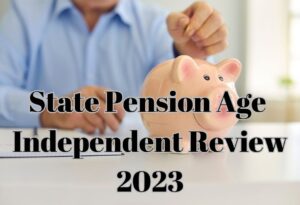Independent Review of State Pension Age
 The latest independent review of State Pension age (commissioned by the Secretary of State for Work and Pensions) has just been published by the government and there are recommendations with regards to the increase in state pension age to 67, 68 and 69. This review follows on from the one undertaken by John Cridland that was published in 2017. None of the recommendations from either of the reviews have been enacted in legislation at this time so things can still change!
The latest independent review of State Pension age (commissioned by the Secretary of State for Work and Pensions) has just been published by the government and there are recommendations with regards to the increase in state pension age to 67, 68 and 69. This review follows on from the one undertaken by John Cridland that was published in 2017. None of the recommendations from either of the reviews have been enacted in legislation at this time so things can still change!
Below is a brief summary from the report via excerpts of the recommendations and we will work on the finer details as soon as possible and check the updates that are required to the articles published on this website.
To summarise:
State Pension Age of 67
The legislated rise in SPa to 67 should continue as planned between 2026 and 2028. Given the very real economic challenges faced by Government and the 11 stark increases in State Pension-related expenditure explored in this report, it is not appropriate to increase costs further by postponing the move to age 67. We note that this change has been set out in primary legislation since 2014 which meets our recommendation of an appropriate length of notice of change (although we note that personal notifications have not yet been sent to this cohort).
State Pension Age of 68
SPa should rise to age 68 over the period 2041-2043. This is earlier than currently legislated for, but later than John Cridland proposed in the first independent SPa review
We have tried to strike a balance: to reflect both the slower rate of improvement that we have seen in life expectancy and the rising number of older people relative to the working age population seen in higher old age dependency ratios. This approach is also consistent with a limit of up to 6% of GDP on State Pension-related expenditure.
State Pension Age of 69
Although we make no firm recommendation, current projections of GDP and State Pension-related expenditure suggest that SPa should rise to age 69 over the period 2046-48. This possible rise should be reassessed at the next SPa review in the light of new fiscal and life expectancy projections. We note that the Government has other tools to control State Pension-related expenditure as a share of GDP beyond adjusting the SPa, including the generosity of pension uprating.
So you can see from the summary of the report that there is a recommendation to increase the state pension age to 69 in due course but it is still early days on this one.
The recommended increase to 68 that was proposed by the Cridland report was never enacted in legislation as the government decided to wait for this second review before doing so. That is likely to mean that the proposed changes to increase to 68 will be delayed by a few years (if the findings of this report are considered correct).
You can see the full report here.